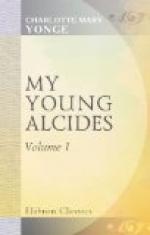It was a very quietly glad evening, as we three sat round the open window, and asked and answered questions. Harold said he would come to the wedding with me the next day; he must see old Eu married; and, besides, he wanted to give up to him the three nuggets, which had been rather a serious charge. Harold, Prometesky, and Dermot had each carried one, in case of any disaster, that there might be three chances; but now they were all three laid in my lap—wonderful things, one a little larger than the others, but all curiously apple-like in form, such gifts as a bride has seldom had.
There was the account of the sale of Boola Boola to be rendered up too; and the place had risen so much in value that it had brought in far more than Harold had expected when leaving England, so that he and Eustace were much richer men than he had reckoned on being.
Mrs. Sam Alison had arrived safely, but rather surprised not to find people walking on their heads, as she had been told everything was upside down. Her son had so far recovered that he could undertake such employment in writing as it was possible to procure. The mother and son were very happy together, but Harold winced as if a sore were touched when he spoke of their meeting.
I was anxious that he should hear of nothing to vex him that night, for there was more than enough to annoy him another day, and I talked on eagerly about the arrangements for the wedding. Hippolyta had insisted on making it a mingled archery and hunt-wedding. She was to wear the famous belt. The bridegroom, her brothers, and most of the gentlemen were to be in their pink; we bridesmaids had scarlet ribbons, and the favours had miniature fox brushes fastened with arrows in the centre; even our lockets, with their elaborate cypher of E’s, A’s, and H’s, depended from the head of a fox.
Prometesky looked amazed, as well he might. “Your ladies are changed,” he said. “It would formerly scarcely have been thought feminine to show such ardour for the chase.”
“Perhaps it is not now,” I said.
“Or is it in honour of the lady’s name? Hippolyta should have a Midsummer wedding, and ‘love the musick of her hounds,’” continued the old gentleman, whom I found to have Shakespeare almost by heart, as one of the chief companions of his solitude.
As soon as Harold heard his boxes arriving, he went to work to disinter the wedding present he had provided—a pretty bracelet of New Zealand green jade set in gold. There was a little parcel for me, too, which he gave me, leading me aside. It was also a locket, and bore a cypher, but how unlike the other! It was a simple A; and within was a lock of silver hair. There was no need to tell me whose it was. “She said she wished she had anything to send you,” were Harold’s words, “and I cut off this bit of her hair;” and when I wondered over her having taken thought of me, he said, “She blessed you for your kindness to me. If I could only have brought her to you—”




